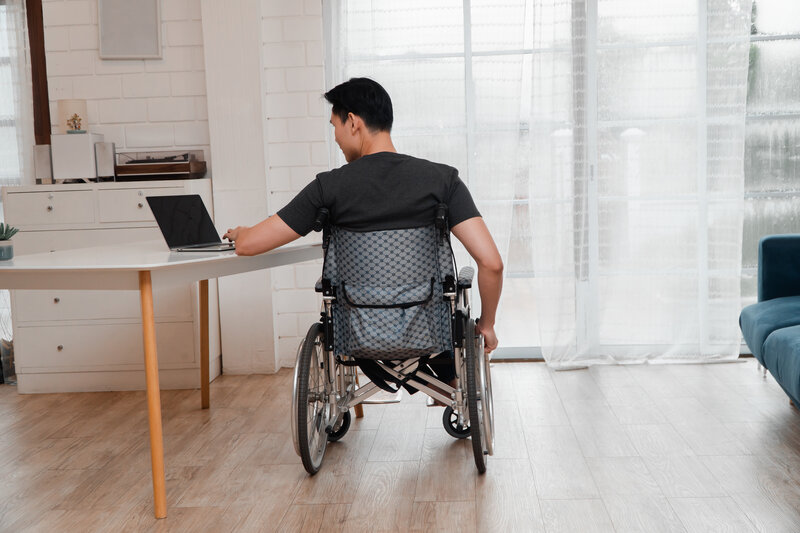
Discover how smart home technology can simplify daily life for those with mobility issues or other physical challenges.
With so much smart home technology available today, it can quickly become overwhelming, particularly for older folks or people with disabilities. However, these groups can benefit the most from smart home devices.
Creating a home network of multiple devices can drastically enhance your safety and make daily tasks more convenient. This guide covers all you need to know about making your home more accessible with home automation, particularly if you suffer from limited mobility or physical disabilities.
How Mobility Issues And Smart Home Automation Go Hand-In-Hand
Most smart home devices utilize a companion app that connects to Wi-Fi. This gives you remote control over many smart devices using only your phone. Smart technology is growing rapidly, with more devices continuing to hit the market, including smart appliances, smart locks, and other devices.
As long as your home has a reliable internet connection, which is the main power source for many devices, you can take full advantage of most smart home tech. These smart home features can help you be more independent and carry out basic tasks with ease.
Convenience is the main benefit since these devices put control at your fingertips. In certain cases, you can also say out loud which task you want the technology to perform for you. Life can become more difficult with age and medical issues but smart home automation relieves all worries for you and your loved ones.
Other benefits include enhanced home security and improved energy efficiency so you can save money.
Smart Home Devices That Can Help The Elderly And Disabled Perform Daily Tasks
Are you curious about how you can make your home more accessible with home automation systems? The following technology is ideal for people with disabilities and mobility challenges.
Smart speakers with voice commands
A smart speaker is a powerful tool that serves many purposes. It can play music, provide audio alerts and even make phone calls all with a simple voice command. Voice control speakers can also serve as a central hub for your smart home if you choose to connect other smart devices.
This automation system makes it easy for you to set reminders to take medication, call loved ones without dialing a number, and much more. Multiple manufacturers produce these products with a voice assistant so there is no shortage of this smart home technology.
Smart locks and video doorbells
Smart homes that feature a video doorbell and smart lock will give any homeowner peace of mind about their security. For elderly and impaired people in particular, these home automation systems simplify answering and locking the doors.
Automated locks connect to an app or smart home hub and give you the freedom to secure your home or let in familiar visitors with the push of a button or voice request. Those who have caretakers or loved ones who frequently visit can give them easy access to the house without needing to get up and unlock the door.
Video doorbells use motion sensors to alert you when someone is at your door. The brand’s app on your phone or tablet allows you to see live footage from the camera as well as provide two-way communication between you and your guest. Set up this equipment above your garage door, main entryway, or any outdoor spot where having a motion sensor makes you feel safer.
These are both great ways of making your home more accessible for those with mobility issues and smart home automation.
Smart lighting
Smart home automation now includes lighting systems, which bring convenience and a better efficiency rate to homes. You can program smart light bulbs to power on and off at certain times of the day according to your routine.
This is the perfect assistive technology for those who are hard of hearing since you can also connect light systems to your doorbell or phone. A switch control will cause the lights to flash when the phone or doorbell chimes so the hearing impaired can tell there is activity.
Leak sensors
Maintaining your home can be quite difficult if you have mobility issues and smart home automation can help. Leak sensors check the plumbing systems around your home and quickly notify your smart device if there is an issue. This early detection is crucial for your safety and lets you know when it’s time to call a professional to repair the leak.
Smart thermostats
Temperature control is an important aspect of home improvement. A smart thermostat is a great way for you to adjust your home’s temperature with a smartphone app. Not only does this smart home device boost your energy efficiency but it ensures comfort at all times.
People with disabilities, especially those in a wheelchair, may not be able to access a traditional thermostat. This technology allows them to automatically adjust the indoor temperature with the tap of a button.
Smart plugs
With so many appliances and devices in your home, it can be difficult to remember to shut off certain technology after using it. Luckily, a smart plug takes care of this problem so you don’t need to worry. This smart home feature automatically cuts off the electricity for devices not in use.
This improves your overall energy efficiency so you can save money on utility bills. It also grants peace of mind to those who may forget to unplug an object for optimum safety. If you operate a smart hub, you can use voice commands to control this smart home technology.
Switch To Smart Home Technology For Easier, More Independent Living
Installing smart gadgets around your home can help you lead a more independent life so medical conditions don’t set you back. You’ll enjoy more freedom and can stick with a normal routine that doesn’t require the help of a caretaker.
In conclusion, smart home technology can be a safe, convenient way to easily carry out everyday tasks. Reach out to the smart device experts at Full Spectrum to learn more about making your home more accessible with home automation. Contact our team at 925-815-8324 to schedule a consultation.
